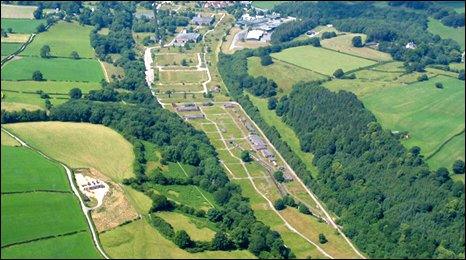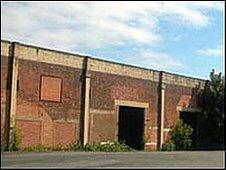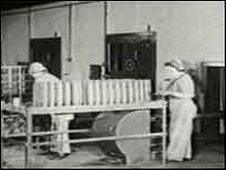Golden history of Flintshire government site revealed
- Published

The government site has had a colourful history
Local historians in a small corner of Flintshire have uncovered more of the colourful history of a classified government site built before the start of World War II.
After a legal battle with the government, archivists have discovered that the site at Rhydymwyn Valley near Mold would have been the secret storage of the UK's gold reserve if the Soviet Union had ever pushed the nuclear button during the Cold War.
According to National Archive documents released under the Freedom of Information Act, if the Soviet Union had declared nuclear war on Britain, the Bank of England's gold reserves were set to be transferred to the site in Flintshire.
Since being founded two years ago, the Rhydymwyn Valley History Society has debunked many of the myths that have surrounded the government site.
Tunnels at the government buildings were used to store mustard gas, and the site was home to experiments into uranium enrichment during World War II which helped create the first-ever atomic bomb.
Historians used the Freedom of Information Act to gain access to previously hidden files on the area, as well as studying historical documents from the Imperial War Museum and taking hundreds of hours of personal testimony from former employees.
'Primary motivation'
Colin Barber, secretary of the society, said that finding out the information had not been easy, but definitely worth it.

Hundreds of people spent WWII making chemical shells at the site
"It's not because I'm a conspiracy theorist, or that I think we're going to find the X-Files or Roswell in the tunnels.
"My primary motivation is because a lot of good people did a lot of difficult work for their country in there, and we ought to celebrate them. Not everyone could be a Spitfire Pilot, but they all did their part, and their stories deserve to be heard."
The Rhydymwyn tunnels were bored into the hillside during 1939, with the express purpose of storing stock-piles of mustard gas.
Imperial War Museum records show that the mustard gas shells processed in the adjacent munitions factory and stored underground in the tunnels would have been used in a carpet-bombing campaign on south-east beaches to poison an invading German army had they followed the British across the Channel in June 1940.
As the threat of invasion began to fade, by 1942 attention at Rhydymwyn turned to another form of deadly weapon, in the hunt to enrich uranium for an atom bomb.
"The things we're discovering aren't only relevant to Rhydymwyn, they have resonance across the globe," said Mr Barber.
Manhattan Project
"There's also evidence that the research conducted into uranium enrichment here, contributed directly to the Manhattan Project which came up with the H-Bomb to end the war in the Pacific."

The film promotes the role of women in doing wartime work
Whilst the authorities have been comparatively keen to assist in the project, when it came to the war-time activities government departments have consistently stone-walled any attempts by to learn what took place after Britain acquired nuclear weapons technology.
A Freedom of Information request was refused, as was the appeal, so the Rhydymwyn Valley History Society was forced to take the government to a tribunal, which finally ruled in their favour.
Amongst the documents released was a letter from the Treasury, to the Cabinet Office in Whitehall, detailing plans to ship about 4,000 tons of gold to Rhydymwyn in the event of an imminent nuclear strike.
It was to be moved anonymously in up to 500 unmarked 10-ton trucks, in an operation which would have taken around 10 to 15 days to complete.
Once at Rhydymwyn, the gold would have been stacked in the tunnels in eight-feet-high piles.
An area was cleared on the surface for heavily armed troops to guard what would have amounted to a third of the nation's wealth.
Mr Barber said: "The assumption was that if the worst happened, then lines of credit were going to dry up, and that food, weapons, provisions etc would have to be paid for up front with gold.
"Around two thirds of Britain's overall reserves would have been out of reach abroad, so Rhydymwyn would have stored literally the only source of wealth open to the government."
But perhaps most interestingly of all, the documents released to The Rhydymwyn Valley History Society have no less than 42 redactions.
For Mr Barber and his team there are yet more secrets to uncover at Rhydymwyn.